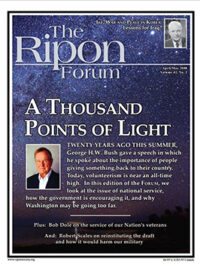
In many circles, playing “Name the Running Mate” ranks behind only the NCAA college basketball tournament brackets as a perennial parlor game for pundits, fans, and other observers. Usually, it’s nothing more than a convenient way to pass the months between the end of the primary season and the party convention. Most political professionals know that a vice presidential nominee will have little impact on the outcome of the campaign: the selection will matter little unless that running mate eventually assumed the presidency.
But John McCain, who would be the oldest person ever sworn in for a first term as President, the decision may be of greater import. For all of McCain’s strengths as a candidate, he has had a historically uneasy relationship with his party’s conservative base. Despite his reputation as a maverick and an insurgent, his quarter century on Capitol Hill makes it more challenging to sell a message of change to the voters. And while his self-deprecating jokes about his lack of familiarity with economic issues have been taken out of context by his political opponents, the declining U.S. economy puts a premium on expertise in this policy area.
Add it all up, and McCain’s choice seems obvious. He needs a younger, conservative jobs creator from outside of Washington, preferably one who can help deliver a key swing state. Which is easier said than done. Based on these criteria, his ideal running mate would be former Governor Jeb Smith of Florida. But since Jeb’s last name is not Smith, this option becomes problematic for other reasons. So who else?
Conventional wisdom is always a risky proposition in the world of McCain, but logic would suggest a small number of Republican governors who fit the bill. Mark Sanford of South Carolina, Haley Barbour of Mississippi, and Jon Huntsman of Utah all represent safe Republican states. But all are strong conservatives with strong economic credentials. As a Congressman, Sanford endorsed McCain eight years ago, but stayed neutral this year, and gossip has it that McCain is holding a grudge. Barbour’s history as a lobbyist before running for elected office may be a difficult fit for a reform-oriented campaign message. Huntsman gets less attention than the others, but he bucked fellow Utahn Mitt Romney to endorse McCain and may get a long look from the grateful nominee.
Two other governors to watch are Tim Pawlenty of Minnesota and Bobby Jindal of Louisiana. Both have compiled impressive records in office and are well-liked by conservatives. Jindal is of Indian-American descent, which could add an appealing cross-ethnic element to the ticket, especially helpful in a race against Barack Obama. But Jindal is only thirty-six years old (the U.S. Constitution requires a President be at least thirty-five) and his youth would make it hard for McCain to argue that Obama is too inexperienced for the Oval Office. Pawlenty, an early supporter who stuck with McCain even during last summer’s campaign meltdown, also has a high profile spot as the host of this year’s GOP convention in Minneapolis, strikes many as an early front-runner.
Two other Washington outsiders remain part of the early speculation as well. Romney is said to be the favorite of Bush Administration insiders, and there’s no question that he brings strong economic credentials to the table. But more than most, McCain is a visceral emotional politician who relies strongly on personal instinct. He and Romney developed an intense dislike for each other during the primary season and it’s difficult to see the two of them repairing that breach anytime soon. And like another former opponent, Mike Huckabee (who McCain does like and respect), Romney has his own difficulties with conservative voters, so it’s not clear how much his selection would help with the base.
The other plausible Washington outsider is the current Florida governor, Charlie Crist. Crist endorsed McCain right before his state’s pivotal primary and is widely credited with delivering Florida for McCain. He has been a regular presence on the campaign trail ever since. But Crist is also considered one of the party’s leading moderate voices and Republican conservatives could revolt if McCain moved left instead of right with his pick. Similar concerns make media favorites like Rudy Giuliani, Joe Lieberman, and Tom Ridge non-starters, but Crist remains a possibility because of Florida’s well-documented role as a general election prize.
… one of the best things about john McCain is his disdain for political orthodoxy.
Other names that surface regularly are Florida Senator Mel Martinez and Texas Senator Kay Bailey Hutchinson, both for demographic reasons, and conservative economic experts Rob Portman, the former director of the Office of Management and Budget, and Securities and Exchange Commission head Christopher Cox. Condoleeeza Rice has said she’s not interested, but rumors are flying that she might end up on a short list. Colin Powell is unlikely, Michael Bloomberg is a non-starter, and South Carolina Senator Lindsay Graham is a virtual lock for Attorney General. (Look for Lieberman to end up in a McCain cabinet as well. Congressmen Paul Ryan of Wisconsin and Mike Pence of Indiana show up on some lists too, but are more likely to join an administration in other roles.)
But one of the best things about John McCain is his disdain for political orthodoxy. So attempting to predict his thinking on such a consequential matter is about as fruitful as filling out your NCAA bracket before the season starts. Only one thing is certain: McCain’s running mate will be someone who the candidate himself believes is qualified to assume the presidency. The rest is just guesswork.
Dan Schnur is a Republican political strategist and lecturer at the University of California-Berkeley. In 2000, he served as Communications Director for Senator John McCain’s presidential campaign.




